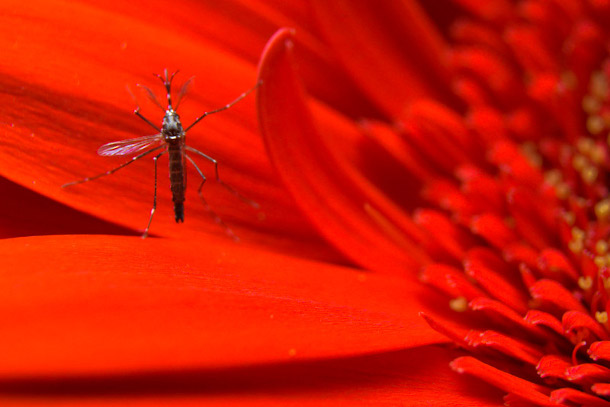EPA Approves GMO Mosquito Trials
Air Date: Week of July 3, 2020

Oxitec’s second generation “AA” friendly mosquitoes are genetically engineered so that all female offspring die at the larval stage. The females are the ones that bite and thereby spread disease from their saliva. (Photo: Courtesy of Oxitec Ltd.)
Biotech company Oxitec is developing genetically modified mosquitoes in hopes of reducing local populations of mosquitoes that carry dengue fever, yellow fever, and the zika virus. Now the Environmental Protection Agency has given Oxitec the go-ahead to test the effectiveness of these GMO mosquitoes in parts of Florida and Texas. Dr. Natalie Kofler, founder of the bioethics group Editing Nature, speaks with Host Bobby Bascomb about how the genetic modification is designed to work and why it is generating concerns.
Transcript
BASCOMB: It’s Living on Earth, I’m Bobby Bascomb
[SFX MOSQUITO SOUND]
BASCOMB: No one likes mosquitoes, the annoying buzzing in our ears, the itchy bites they bring and of course the diseases they can transmit. In fact, some three quarters of a million people die each year from mosquito borne illnesses, indirectly making the lowly insect responsible for more human deaths than any other animal in the world. So, it’s not shocking that humans try to control mosquito populations. And now researchers with the biotech company Oxitec have come up with a genetically engineered mosquito that they hope will reduce mosquito populations without using ecologically damaging pesticides. Oxitec recently received EPA approval for their first US field trials in the Florida Keys this summer and Harris County, Texas next year. But the approval is controversial and has garnered push back from ethicists and molecular biologists including Natalie Kofler. She’s founding director of Editing Nature, a working group on the ethics of genetic modification and an advisor for the Scientific Citizenship Initiative at Harvard Medical School. Natalie Kofler, welcome to Living on Earth!
KOFLER: Thank you. Thanks for having me.
BASCOMB: So Oxitec is focusing on a genetic solution to control a specific species of mosquito, why are they starting there?
KOFLER: Yeah, so the mosquito that they're targeting is the species called Aedes aegypti. And the way that they're they've made a genetically modified version of this mosquito is they've introduced a gene into the mosquito that when it makes in the wild, it will pass on a gene to its offspring that causes lethality or death in the female offspring of that mosquito. In this way, all female mosquitoes from those meetings will die. And over time, as you can imagine, if there aren't females around, the population will collapse. So the intention is to reduce local mosquito populations. And in doing that be able to then hopefully reduce transmission of the diseases they carry.

Dr. Natalie Kofler is the founding director of Editing Nature, a working group on the ethics of genetic modification, as well as an adviser for the Scientific Citizenship Initiative at Harvard Medical School. (Photo: Courtesy of Natalie Kofler)
BASCOMB: And they recently got EPA approval to release some of their patented mosquitoes at sites in Florida and Texas. What are they trying to do there and how likely is it to be allowed to move forward?
KOFLER: So really what the EPA here is allowing Oxitec to do is release their mosquitoes into the wild and test to see if they are actually able, with their genetically modified mosquitoes, to reduce the population Aedes aegypti in those locations. But this is really a landmark decision. It's the first time a genetically modified mosquito has been approved for release in the United States. Oxitec did attempt to do this already in 2016 and 2017, in trying to release a previous version of this mosquito. And they actually were eventually rescinded their request, because of public pushback within the communities in Florida, where they were trying to release. So this is sort of their second attempt of doing this. And it's something that we're watching really, really closely to make sure that this moves forward in a responsible way.
BASCOMB: And what was the pushback from residents in Florida at the time?
KOFLER: I mean, generally concerns is probably what anyone would sort of be concerned about the idea of a genetically modified organism and being sort of the first test site in the US where that would be released into your into your common environments, right. There's no way to do these field trials in a contained way. The mosquitoes are literally you know, sent out into the air and fly around and are sent out to mate with other wild mosquitoes. And so people had a variety of concerns both for their own health as well as for the health of the environment. Of course, there's concerns at that point of what happens if a genetically modified mosquito were to bite me, you know, is there any risk to me, or an allergenic risk if a GM mosquito were to bite? This new strategy that they're using is a bit different because only female mosquitoes are able to bite and Oxitec's new version of this mosquito exclusively with releasing males. So there shouldn't be any risk there if it works as expected. And then, of course, there was also a lot of concerns around potential ecological damage. You know, what happens when you start collapsing populations in the wild in this way? So there's a lot of uncertainty here. And I think that's really the main sort of underpinning of why people have a lot of concerns. We just don't know enough yet about how this would work in the wild.
BASCOMB: What sorts of rules are in place for testing and oversight before these modified mosquitoes are released into the environment?
KOFLER: Well, so Oxitec you should know has already been releasing these mosquitoes for over a decade, at least certain versions of them, in Brazil and other countries in South America. So, we would not be the first site where release has occurred. And they have been doing assessment of these mosquitoes to see whether or not for example, they integrate into the wild as they shouldn't, to see if they can see collapse of the populations, they do see collapse of the populations. However, they have yet to prove any reduction in say Dengue fever transmission in Brazil, where they were doing field trials. And so, there are some preliminary data that shows that this technology could be effective in reducing mosquito populations. What we have concerns about is that there isn't necessarily adequate data about around ecosystem impacts, really adequate, stringent studies on potential health impacts and the changes in vector capacity that happens when these mosquitoes are specifically targeted through a genetically modified technology. And the third concern and a really major one is a lot of the data that's being presented to say the EPA in this case has been accumulated assessed and experiments designed by Oxitec themselves. So there's very little data coming from third party independent researchers.
A capsule of GM Mosquito eggs held by an Oxitec scientist. The tests in Florida are for release from boxes spread in strategic locations (sometimes in human populated areas), and Oxitec is developing egg capsules for more efficient releases. Continuous release is required to prevent recolonization by the Aedes aegypti mosquitoes. (Photo: Courtesy of Oxitec Ltd.)
BASCOMB: So you're concerned then that maybe there's not enough oversight, not enough independent oversight for this?
KOFLER: Yeah, I'm concerned that there's not enough independent oversight. I'm concerned that there's not enough interdisciplinary oversight. You know, these are really complex decisions that are being made. You need to have ecologists, you need to have public health experts, you need to have vector biologists, you need to have ethicists, and geneticists all at the table to make these choices. And so I also have concern that there isn't even the broad amount of expertise that needs to be there. And of course, it's also concerning when it's a, when it's a for profit company. And in some ways, they have a lot of vested interest to make sure that they do this well and safely or that, and they, because they could lose a lot of money and they could lose, you know, trust in their product. But at the same time, it leads to a lot of opacity in this process. And so I think that's concerning as well is that it needs to be more transparent and there's a lot of parts of the EPA submission that the public is generally not allowed to access because it's, you know, under patent protection and things like that. So there's a really strong justice argument here where those people that live in those environments have the right to the decisions that are being made about release of genetically modified mosquitoes into their communities. And right now, our regulatory processes do not engage the public even close to the level that they should be to make these choices fairly.
BASCOMB: What about the ecological impacts of suddenly reducing the population of a species of mosquito? I mean, plenty of birds and bats rely on mosquitoes as part of their diet. And I've heard of some species of orchids that are only pollinated by mosquitoes.
KOFLER: The general belief is that there are you know, in the world there's thousands of different mosquito species and even in these locations where the Aedes aegypti GM mosquito would be trialed, there are other mosquito species present. So the idea is that you could have other mosquito species fill those voids in a way that may actually in some ways if it could be done safely more environmentally sustainable than sort of doing broad application of pesticide for example, which would kill all mosquitoes and perhaps many other insects as well. So there's the possibility that if it's done well, it could actually be a more environmentally responsible measure. Again, this comes back to the situation of just how little we still know. And there's a lot of uncertainty. And I think we need to be understanding the unknown risks, you know, or at least acknowledging the unknown risks of what could happen when you start messing with food networks this way. And I think the second issue that needs to be really strongly considered, you know, with this appreciation of the intricate link between environmental health and human health, you know, is what happens when you specifically target one vector of a disease is another vector going to step in another mosquito species that may be more difficult to control that might be even more able to spread the disease more easily, and be more virulent. And these are really major concerns that again, we still don't have have the answers to.

Dr. Nathan Rose is Head of Regulatory Affairs at Oxitec. (Photo: Courtesy of Oxitec Ltd.)
BASCOMB: Natalie Koffler is a molecular biologist and founding director of Editing Nature. Natalie, thank you for taking this time with me today.
KOFLER: Thanks so much for having me.
BASCOMB: For a response we spoke with Nathan Rose, Head of Regulatory Affairs with Oxitech. He told our producer that the EPA reviewed thousands of pages of data Oxitech submitted to them.
ROSE: The EPA is independent. EPA is a government agency. And so they are the primary reviewers of this technology and of any technology that's it calls itself a pesticide or a bio pesticide as this is. And so EPA scientists that worked on this, included molecular biologists, they included ecologists, they included experts in modeling of what happens to populations.
BASCOMB: To hear more of Mr. Rose’s response go to the Living on Earth website, LOE dot org.
Statement from Oxitec
"We are delighted with the U.S. Environmental Protection Agency’s (EPA) decision to grant Oxitec an Experimental Use Permit (EUP) for piloting its 2nd generation Friendly™ Aedes aegypti mosquito technology, the result of an in-depth and rigorous scientific review process that included technical support from the U.S. Centers for Disease Control (CDC) and an expansive assessment of the technology and its safety relating to humans and the environment. The EPA’s positive findings are fully consistent with findings by regulators and public health officials around the world who have approved of and validated Oxitec technologies as safe and self-limiting over the past 15 years."
For more, click the links below.
Links
The Guardian | “Plan to Release Genetically Modified Mosquitoes in Florida Gets Go-Ahead”
The Boston Globe | “Before Genetically Modified Mosquitoes Are Released, We Need a Better EPA”
Read the EPA’s statement on the approval, and accompanying public comments here
Click here to listen to Living on Earth’s segment on genetic engineering of mosquitos from 2012
Living on Earth wants to hear from you!
Living on Earth
62 Calef Highway, Suite 212
Lee, NH 03861
Telephone: 617-287-4121
E-mail: comments@loe.org
Newsletter [Click here]
Donate to Living on Earth!
Living on Earth is an independent media program and relies entirely on contributions from listeners and institutions supporting public service. Please donate now to preserve an independent environmental voice.
NewsletterLiving on Earth offers a weekly delivery of the show's rundown to your mailbox. Sign up for our newsletter today!
 Sailors For The Sea: Be the change you want to sea.
Sailors For The Sea: Be the change you want to sea.
 The Grantham Foundation for the Protection of the Environment: Committed to protecting and improving the health of the global environment.
The Grantham Foundation for the Protection of the Environment: Committed to protecting and improving the health of the global environment.
 Contribute to Living on Earth and receive, as our gift to you, an archival print of one of Mark Seth Lender's extraordinary wildlife photographs. Follow the link to see Mark's current collection of photographs.
Contribute to Living on Earth and receive, as our gift to you, an archival print of one of Mark Seth Lender's extraordinary wildlife photographs. Follow the link to see Mark's current collection of photographs.
 Buy a signed copy of Mark Seth Lender's book Smeagull the Seagull & support Living on Earth
Buy a signed copy of Mark Seth Lender's book Smeagull the Seagull & support Living on Earth

